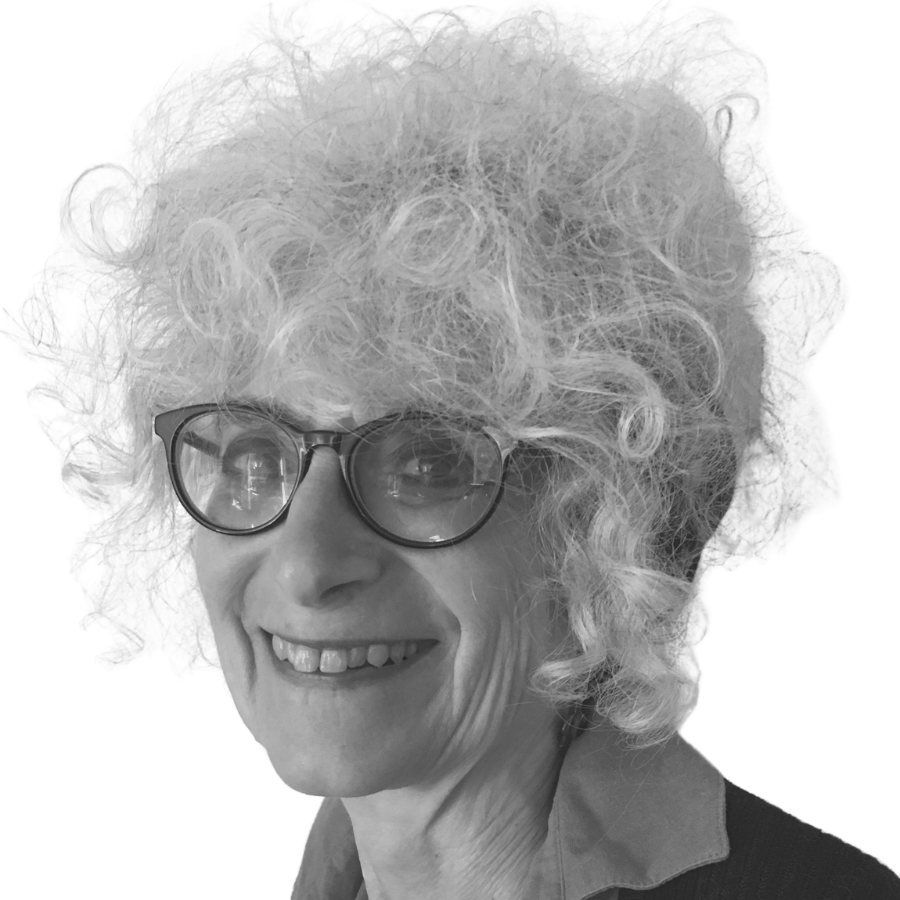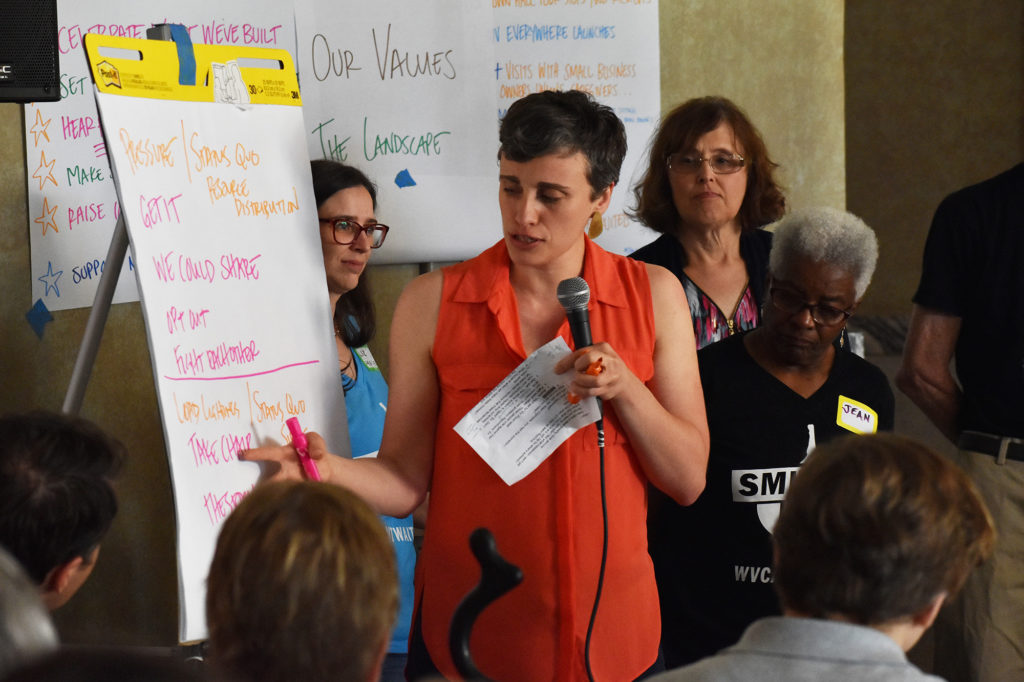This is the third installment of Organizing Upgrade’s new interview series, “Mapping the Moment.” We’ll be talking with activists and organizers about pressing issues and strategic questions that define the terrain our movements work in. To start, we asked people how they understand the Democratic Party at the moment. How do we understand the rifts in the party as a new economic policy direction emerges? How do we push moderate Dems and take advantage of openings for leftists and progressives – while fighting the Right at the same time? But 80 years of Democratic control of their state have persuaded many West Virginians that the Democratic Party establishment can’t be trusted. Katey Lauer is the co-chair of West Virginia Can’t Wait, an organization founded in 2017 to build working-class political power in the state – independent of either political party.
We Need To Build a New Political Home
Marcy Rein interviews Katey Lauer
Our questions for this set of interviews assume some kind of engagement with the Democratic Party – but does that really apply for you in West Virginia?
Katey Lauer: The vast majority of us know we aren’t represented by either of the major party establishments in West Virginia.
At our very first stop on our 2018 campaign tour, we ran into this guy who was taking a smoke break outside of a post office where he worked.
Our candidate for governor said to him, ‘Have you been thinking about the upcoming election?’
And this guy said, ‘As far as I can see it, you can vote for the snake that will bite you or the bear that will eat you.’
Many of the challenges we face under the Democratic Party leadership in West Virginia are just as challenging as some of what we face under Republican Party leadership and so we don’t have a lot of party loyalty.
What WV Can’t Wait is interested in is creating another political home and an alternative political machine.
Can you say just a bit about what those challenges are?
KL: West Virginia is in a state of constant crisis. In the last six years, we’ve had two really significant floods. There was a major storm, a derecho, that leveled homes and did a lot of damage in multiple counties. We had a big chemical spill and 300,000 people lost their drinking water. Plus there are the ongoing issues: overdose deaths, a capital city that has the largest HIV outbreak in the country right now, our teachers continue to be underpaid….
There’s this question we get asked a lot by outsiders, about the relationship between wealth inequality and white nationalism. First of all, racism exists everywhere. It’s built into the fabric of our country just like classism is. It’s not unique to West Virginia.
And, I think white nationalism is an important thing for us to talk about. We have to take it on because it’s the right thing to do and because a multi-racial movement is essential to us winning a government that works for all of us. What outsiders sometimes miss are the dozens of other things that are also incredibly acute pressing issues here – things that will also determine the future of our state and our people’s ability to stay here and live here and to live lives with dignity.
Is there a history to people’s disenchantment with the Democrats?
KL: The Democratic Party was in control for a very long time here and people’s lives got worse. Folks’ distrust in the party establishment is not misplaced. They had 80 years to try to do it right.
If you hear folks talk about the 1960s and ‘70s, folks who lived through the War on Poverty and the aftermath, there was prominent Democratic Party leadership then across the state. A lot of federal funds for projects to address poverty got caught up in the Democratic Party establishment, in local machines and in the state machine in a way that a lot of those resources never made it to working people.
Today, Manchin runs that same machine. Manchin is why we have the governor that we have now, Jim Justice. It is incredible to me that a party, the Democratic Party, that claims to stand for working people put at the top of their ticket the richest man in all of West Virginia, who is also a coal baron, who also has unpaid fines to his employees.
You can see what it’s hard for us to tell these party establishments apart.
On the federal level, there’s no admission from the national Democratic Party about the ways NAFTA and some of the party’s other choices from the Clinton era hurt places like ours. Now, the Party isn’t offering a viable vision for what it could look like for communities that are devastated by the loss of the coal industry to have some other kind of option – and that includes national progressives. There was not a move to engage West Virginians in the imagination of what a Green New Deal could look like.
Joe Manchin is getting a lot of media and political attention. What’s up with him? How much hope can we have in his being moved by the pressure being applied from all over?
KL: Joe Manchin likes to situate himself in the comfortable corporate middle.
Because he has amassed so much power over time, and because he’s primarily able to get into office now because of his corporate and his political relationships, he doesn’t have to answer to us. Joe Manchin isn’t persuadable by the state party, which he runs. He’s not persuadable by his small dollar donors because he has such significant major corporate donors.
National organizations show up in these moments in the lead-up to a Manchin vote and try to make major interventions to move him. But we risk getting looped into a cycle where we just keep pouring an incredible amount of resources into a nearly impossible persuasion project. If we don’t think about diverting our resources toward building an alternative machine that can take him on, we’re going to stay stuck here.
So part of what I’m rooting for is: let’s do the power-building work. Let’s groom someone that in 10 years will be the next Joe Manchin, but ours, someone that will belong to working people. And we can’t get there if we don’t come to value that kind of long-haul work.
What is West Virginia Can’t Wait’s power-building strategy?
KL: We used the vehicle of a governor’s race starting in 2018 to build out teams and leadership and structures across the state that could outlast an election cycle – to start to build a mansion.
There were three components to that. First, we recruited candidates to run for office, that was one leg of the stool. We had 101 no-corporate-cash candidates, all told.
We also recruited county captains that would then go out to build county teams. And we recruited constituency captains that built constituency teams. One of the ways it was initially structured is that those teams would have quarterly mandates from the campaign to do a particular organizing project. One of those might be to host the town hall and invite lots of people into it. One of those might be – we did a “summer of 10,000 conversations” drive around the state and so the teams were to have 100 conversations each with people in their county.
The machine keeps evolving. One of the things that they’re working on now is recruiting candidates and other folks from our base that want to work on 2022 races.
The idea is that these groups of people can have standing relationships and grow in skills together and grow in experience together such that we can contest for power across cycles, versus trying to build something new every time a new election season comes around.
We are almost four years into running experiments to figure out what it takes to build working-class power in a place like ours. Some of the experiments that we’re trying include things like running slates that are cross-partisan or running candidates in nonpartisan races. It includes things like asking candidates to sign “no corporate cash” pledges. It includes building aid and service programs into our organizing.
We think these experiments are worthwhile. We’re not sure if the answer exists in them or not–they’re experiments – but our hunch is that we need to do the work to find out. Otherwise our state’s going to keep staying in the shape that it’s in.
In a moment of such political polarization, how do you bring people together?
KL: We think about the traditional and planned ways in which folks who maintain corporate control utilize dividing lines among us. Republicans often use race and racism, anti-immigrant sentiment, transphobic talking points. I think Democrats are also guilty of this, though they’ll divide us across class or across place or culture. Hilary Clinton’s comment about “deplorables” will long be remembered here.
And sometimes it works, right? So often it works. In the West Virginia Mine Wars, for example,
it was incredibly difficult to form a multi-racial coalition of miners to fight back against company bosses because company bosses would use anti-immigrant or anti-Black rhetoric and then physically divide people in terms of where their homes were placed in the coal camps.
They knew that when working people fight each other, we lose.
Ultimately the UMWA was strong enough to hold a multi-racial coalition that could fight back and did. Tens of thousands of people took on the company bosses.
That history of union organizing was erased from the official record in the state, and it only lived in oral histories. Over the last decade or so, there’s been a real resurgence of people claiming that history. I think the teachers’ strike was a part of that.
It’s hard to describe how absolutely incredible it felt to live through the teachers’ strike.
There was this buzz in the air everywhere around the state. Every single county in the state went out and it was just electric – and that’s part of our history now too.
There’s a lot about West Virginia history that we can be proud of and I think part of our political project is saying so and claiming it and owning it and seeing how we are a part of this longer arc of incredible organizing in this state.
Did you enjoy this article?
We're in the middle of our annual fund drive, and this year we're building our own internal infrastructure for subscriptions, meaning more of every dollar pledged goes to fulfilling our mission. Subscribe today to support our work and be a part of Convergence's next evolution.

